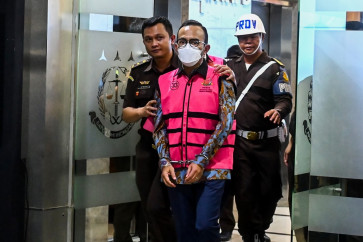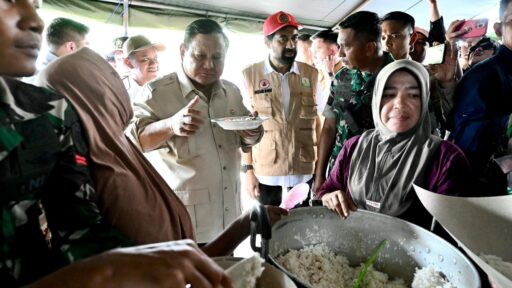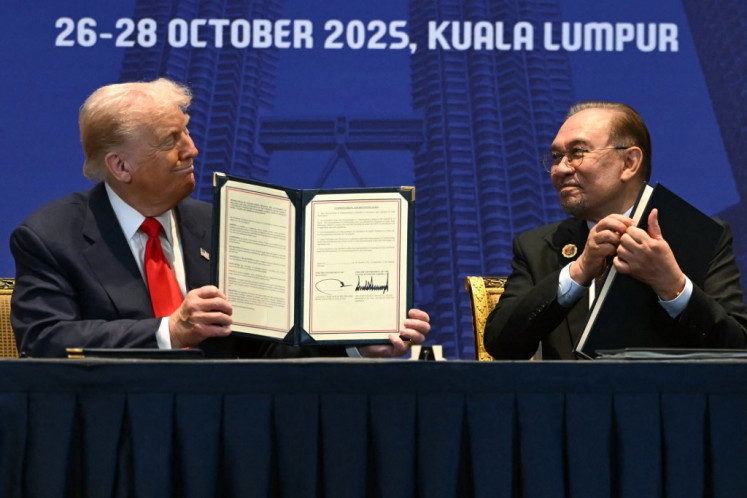Popular Reads
Top Results
Can't find what you're looking for?
View all search resultsPopular Reads
Top Results
Can't find what you're looking for?
View all search resultsProtecting the vast waters of Indonesia
The new government has to design a national system of sea-lanes that links domestic and international routesFrom 2012 to mid-2014, reports showed piracy and robbery at sea in Southeast Asia were fluctuating, which is alarming
Change text size
Gift Premium Articles
to Anyone
 Ruling the waves: Patrolling Indonesian Navy personnel monitor fishing activitiesin Benoa waters in Bali ahead of an international conference held there early in May 2014. A strong naval force is imperative for protectingthe countryâs vast maritime territory and strategic internationalinterests. (Antara/Nvoman Budhiana) (Antara/Nvoman Budhiana)
Ruling the waves: Patrolling Indonesian Navy personnel monitor fishing activitiesin Benoa waters in Bali ahead of an international conference held there early in May 2014. A strong naval force is imperative for protectingthe countryâs vast maritime territory and strategic internationalinterests. (Antara/Nvoman Budhiana) (Antara/Nvoman Budhiana)
The new government has to design a national system of sea-lanes that links domestic and international routes
From 2012 to mid-2014, reports showed piracy and robbery at sea in Southeast Asia were fluctuating, which is alarming.
Data from the International Maritime Bureau (IMB) and the Regional Cooperation Agreement on Combating Piracy and Armed Robbery against Ships in Asia (ReCAAP) indicated that these incidents took place mostly in Indonesian waters and the Strait of Malacca and Singapore.
Securing the sea-lanes of communication will be paramount in terms of world economic activity. Littoral states around these straits have taken additional action to improve security, but questions remain as to who is supposed to secure these straits apart from Indonesia, Malaysia and Singapore, or in other straits used for international seaborne trade. There are also questions regarding the real motives behind these incidents and what initiatives have been launched to tackle the crimes.
Every year many ships pass through Indonesian waters carrying cargo ranging from crude oil to finished products from all over the world.
Indonesian waters contain critical sea-lanes of communication for seaborne trade, naval movement and other maritime interests.
Indonesian waters have at least six choke points, comprising the Strait of Malacca, the Singapore Strait, the Sunda Strait, the Lombok Strait, the Ombai Strait and the Wetar Strait; all used for international navigation.
While Indonesia has strategic interests in commerce, peace, stability and security in the region, it must also address potentially negative effects associated with international navigation, such as marine pollution, the degradation of marine resources and maritime criminal activities.
Indonesian waters have become the focus of strategic attention by user states due to a number of factors, including economic, military and oil or energy concerns. These factors are interrelated and exert distinct dynamic impacts and outcomes for all concerned states. On the other hand, Indonesia has to take the necessary steps to tackle the negative effects of seaborne trade within its waters.
Indonesia has many obligations pertaining to navigation, such as providing sea-lanes for ships passing through their waters and guaranteeing security and safety. Indonesia needs to ensure that these sea-lanes are navigable, safe, secure and do not endanger the marine environment.
Ruling the waves: Patrolling Indonesian Navy personnel monitor fishing activitiesin Benoa waters in Bali ahead of an international conference held there early in May 2014. A strong naval force is imperative for protectingthe country's vast maritime territory and strategic internationalinterests. (Antara/Nvoman Budhiana)
To ensure navigation safety, protection and the preservation of the marine environment, Indonesia needs to establish supporting technology such as satellites. Our navigational system should be sufficient to cover the entire area of sea-lane communications and should be accessible to ships.
Substantial financial resources are required for the acquisition and maintenance of such equipment considering the considerable spatial extent of its waters.
It is difficult for Indonesia to bear all these financial costs on its own. Under international law, Indonesia does not have the right to impose levies on foreign ships exercising passage rights in Indonesian waters with a view to defraying these substantial costs.
The government has made substantial and sustained efforts to maintain the safety and security of its sea lanes of communication by updating paper and electronic charts, installing navigational aids, broadcasting maritime hazards and weather forecasts and patrolling certain areas.
In response to suspected criminal incidents, the authorities deploy warships as the incident is broadcast, but by the time the warships arrive, the reported ships have disappeared. Prosecution is thus difficult and criminal activities persist with alarming frequency.
Further, it must be defined clearly what constitutes robbery, piracy and other criminal activities. Piracy is well defined in international law and some domestic laws of certain countries, but robbery at sea and definitions of petty theft, for example, are vague. In Indonesia's experience, many incidents reported include indications of motives to secure insurance entitlement.
With respect to economic and security matters, Indonesia's needs and interests are similar to other user states or ships ' that sea-lanes of communication should be safe and secure and should not potentially damage the environment.
However, Indonesia's interest is deeper since it would assume responsibility in the event that a suspected crime occurred in the choke points or straits. Further, considering the proximity of the choke points to Java, the most populous island and the center of the country's economic, political and government activities, Indonesia's interest in these choke points can be considered fundamental to its national interests.
Over the last few years the significant increase in the amount of energy (oil, gas, and coal) and goods being transported through the straits or choke points has brought greater pressure on coastal states to invest in sophisticated and expensive navigational equipment to ensure the safety and security of passing ships.
The dangers of such passages are associated with the high volume of maritime traffic and in particular the transport of dangerous and hazardous cargo. Moreover, the value of the cargo will always attract criminals.
The issue is whether coastal states or archipelagic states like Indonesia have to bear this burden on their own or whether they can share this burden with other user states.
Japan and the US, for instance, have made some efforts to secure the Malacca and Singapore straits and also other sea-lanes, but user states need to offer additional initiatives and assistance for the mutual need of the straits' security.
On the basis of equity as well as sound economics, since states derive significant benefits from their use of the straits or choke points, it seems fair that user states, maritime powers or ships that benefit from the use of the Indonesian straits and choke points should share the burden of improving the safety of these straits or choke points. Criminal activities need to be defined clearly, as there are many motives that can be traced to the root causes of the activities. Broadcasting the incident without clearly posting the location of a suspected crime at sea will not help in tackling the issues. Motives of the criminals always vary and it happens by design.
Considering that the new government has pledged to focus more on maritime issues, it should be noted that Indonesia has dedicated its sea-lanes of communication as archipelagic sea-lanes in exchange for UN recognition of the archipelagic concept of Indonesia. The country has therefore allocated three north-south sea-lanes that foreign ships can pass through.
The ocean 'toll road' that president-elect Joko 'Jokowi' Widodo has campaigned for, which would connect one port to another within the Indonesian archipelago, should be connected to the three existing international sea lanes. This connectivity will guarantee not only fast, but also the safe and secure flow of goods and services.
Further, the new government has to design a national system of sea-lanes that links domestic and international routes.
Under such a system, Indonesia must decide which domestic ports are opened and connected to international routes, because inter-insular trade within the archipelago needs protection from free competition.
Of course, this new connectivity of commercial routes will also attract criminal activities, which is why Indonesia has to enhance its maritime security system.










